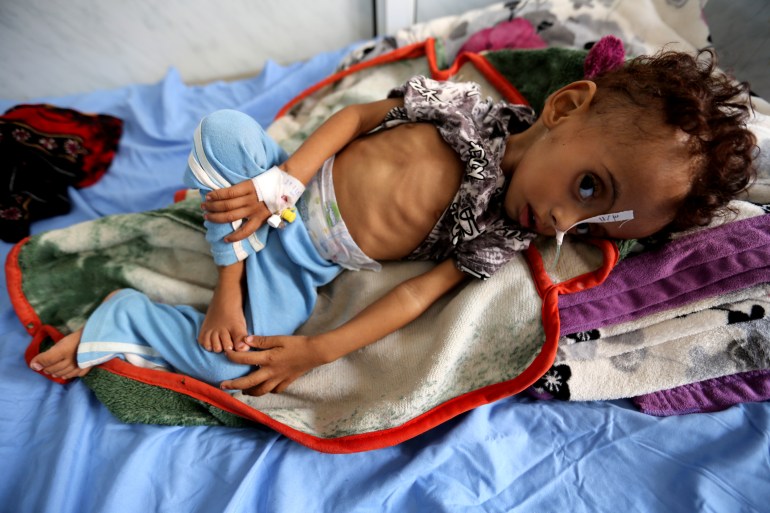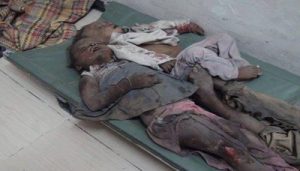Will The Saudis Stop The Genocide In Yemen?
![A nurse holds a malnourished girl at al-Sabeen Hospital in Sanaa, Yemen [Khaled Abdullah/Reuters]](https://www.aljazeera.com/wp-content/uploads/2020/11/2020-10-27T132549Z_1047694536_RC21RJ9UM7BU_RTRMADP_3_YEMEN-SECURITY-MALNUTRITION-e1605187861535.jpg?resize=770%2C513)
The United Nations has once again warned of millions of men, women and children in war-torn Yemen are facing famine as it issued yet another appeal for more money and a halt to the fighting to prevent it.
“We are on a countdown right now to a catastrophe,” UN World Food Program (WFP) Executive Director David Beasley told the UN Security Council on Wednesday. He added: “Yemenis not going hungry, they are being starved” by Saudi Arabia.
The U.S.-backed Saudi-led military coalition intervened in Yemen in 2015, backing government forces fighting the Iran-allied Houthi group, which had captured the capital city of Sanaa a year earlier.
President Barack Obama began providing assistance to the Saudis for its war in Yemen, which killed more than 6,000 civilians by the time Obama and Biden left office — since then, more than 100,000 people, including fighters and civilians, have been killed.
Under the Obama-Biden administration, the Saudis relied on U.S.-provided intelligence to run missions in U.S.-provided planes that dropped U.S.-made bombs on hospitals, schools, markets and funerals. The Trump administration has only increased support for the genocide of the Yemenis at the hands of the Saudis to new heights with his continual sale of weapons to Riyadh.

Trump has done so by bypassing both Democrat and Republican bipartisan legislation in 2019 that would have blocked or limit U.S. weapons sales to Saudi Arabia, the United Arab Emirates and Jordan — Jordan and UAE is also part of the Saudi-coalition in Yemen. He issued an emergency declaration to finalize a deal that sold $8.1 billion in armaments to the three countries. This has allowed the Saudis to deliberately continue to target civilian infrastructure — they arbitrarily attack homes, farms, factories, schools, buses, gas stations, water treatment facilities and anything else imaginable.
In addition, past U.S.-Saudi enforced blockades have prevented sufficient food, medical supplies, fuel, clean water and other essentials from reaching desperate people in need. Human Rights Watch, as early as 2015 warned that what is ongoing “may amount to starvation of civilians as a weapon of warfare” — genocide by deprivation.
Why is the U.S.-led West helping Saudi Arabia?
The White House justifies its support for Riyadh in order to curtail Iran’s influence in the region; Tehran sides with the rebel Houthis. The ultimate reason, however, tends to be a financial one.
According to a 2017 report, Saudi Arabian oil is drying up, and scientific research by international drilling companies show that Yemen’s unexploited oil reserves are greater than the combined reserves of all the oil-rich Gulf states.
Yemen, the poor man of the region, has emerged as the place to exploit. Yemeni expert Mohammad Abdolrahman Sharafeddin had told Fars News: “63% of Yemen’s crude production is being stolen by Saudi Arabia,” explaining that Saudi-U.S. military action is already paying dividends for the invaders.
“Saudi Arabia,” Sharafeddin adds, “has set up an oil base in collaboration with the French Total company in the Southern parts of Kharkhir region near the Saudi border province of Najran and is exploiting oil from the wells in the region.”
But it gets worse for the Yemeni people, caught in a trap due to the fact they have billions of barrels of crude flowing deep under the houses where their children sleep — a reason why the Saudis target civilian sites.
Sharafeddin said that Riyadh is purchasing “arms and weapons” with the petro dollars being stolen from the Yemeni people. These arms and weapons are then supplied to Saudi-sponsored mercenaries with instructions to “cut loose” in the country, slaughtering Yemenis in oil-rich regions — Yemeni economist Yemeni Economist Hassan Ali al-Sanaeri sustains that as early as 2016, both Washington and Riyadh had bribed the former Yemeni government to refrain from oil drilling and exploration activities, adding that Yemen has more oil reserves than the entire Persian Gulf region.
What to expect?

It is interesting that while former President Obama, who won the Noble Peace Prize, while criticizing President Donald Trump’s Middle East policies, has refrained from publicly denouncing the Saudis for its role in the murder of journalist Jamal Khashoggi, as with the genocide in Yemen which he helped get off the ground. On the other side, Trump who has been a “champion” in defending life in the mother’s womb, making him the “pro-life president,” has vehemently ensured the Saudis have every means necessary to carry out their mass annihilation of the Yemeni people — neither Obama or Trump have acknowledged their culpability for what is now the world’s worst ongoing humanitarian catastrophe, nor have they tried to publicly atone for it.
Joe Biden has sworn that it is time to stop aiding Saudi Arabia — we will see what happens with that. Scores of fellow Obama alumni agree. In public appearances, op-eds and joint letters, prominent figures including former national security adviser Susan Rice and her deputy Ben Rhodes have said President Trump must end the policy that they initiated.
It is time for the U.S.-led West to end its blind coddling of a tyrannical and pretentious ally with an abysmal human rights record on par with the Chinese Communist Party and the Iranian regime. If the U.S. stops backing the Saudi-led collation in Yemen, other countries will follow — the Saudis would then have not choice but to stop fighting. Otherwise, history will remember that leader of the free world for abetting the Saudis in their crimes against humanity.
__________________________________________________

Mario Alexis Portella is a priest of the Cathedral of Santa Maria del Fiore and Chancellor of the Archdiocese of Florence, Italy. He has a doctorate in canon law and civil law from the Pontifical Lateran University in Rome; he also holds a M. A. in Medieval History from Fordham University, as well as a B.A. in Government & Politics from St. John’s University. He is also author of Islam: Religion of Peace? – The Violation of Natural Rights and Western Cover-Up.
Book available on Amazon, Barnes & Noble or WestBow Press.






Recent Comments